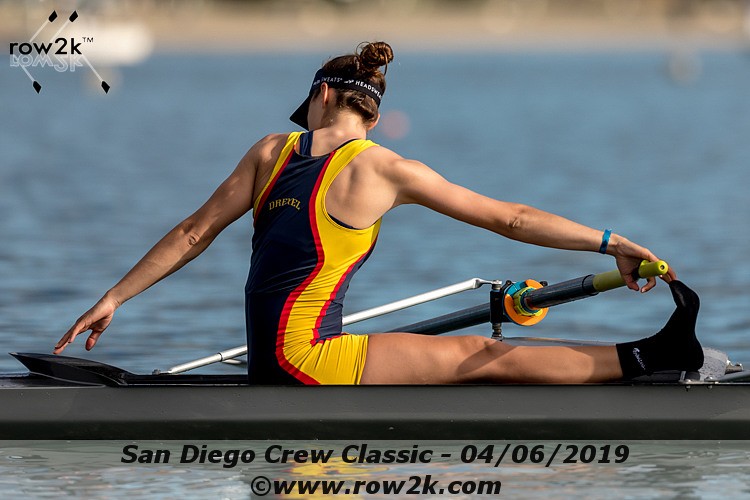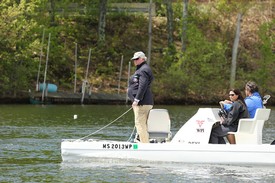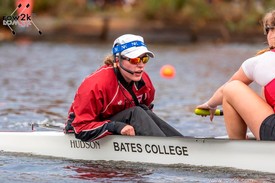
Last month we offered some tips on how to make erg training more enjoyable, along with ways to use the erg to improve your on-the-water rowing. If you need, or simply want, to get better on the erg, there are no short cuts; you'll have to spend time on the machine.
If, however, you're like me and are mostly a single sculler, no one is going to knock you out of your seat over a sub-par erg score. I'm not encouraging anyone to give up on the erg, but I do believe strongly in cross training. Mentally and physically, it will provide a break while still allowing you to stay in shape.
Swimming, running, cross-country skiing, tennis, cycling - whatever works for you. If you like training alone, pick a sport you can do solo. If you need the motivation of a group or team, seek one out. After spending most of the year rowing the single without a training partner or coach, I love getting back in the pool in the winter with teammates to motivate and push me, and a coach to set the workout.
Now is also a good time to reflect on your season, what went well and what didn't. Did you get injured? Did you start fast and fade? Had good power but bad technique that kept you from reaching your potential? Vice versa? Plan your winter training around those weaknesses and turn them into your strengths.

If you were injured, what can you do to prevent a re-injury? Did a lack of flexibility lead to your injury? Find a pilates or yoga class or simply make stretching part of your daily routine. If you have a nagging injury, find a trainer or physical therapist that can help create a program to address your needs. Another benefit of stretching is that more flexibility may lead to a longer stroke.

Weightlifting can also be important in preventing injury, not to mention making you stronger. As we get older, we lose muscle mass at a faster rate. While weights won't stop this process, it can certainly slow it down. Injuries are often caused by a muscle imbalance - too much pulling, not enough pushing - causing us to work one muscle group without working the opposing group.
Women particularly are prone to cracked ribs and/or intercostal muscle pulls from all the pulling motion in rowing. If you add bench press or better yet, push-ups, to your routine, that injury can be prevented. If you can't do regulation push-ups, start from your knees and build up to being able to do them from your toes. If you're new to weight lifting, find a coach or trainer to put together a program specific to your needs. Make sure to learn proper lifting technique before you begin any new program.
In the end though, the best kind of training is the training you'll do. How can you make it more fun? How can you make it fit into your busy schedule? Change it up so you don't get bored. Find people to train with to push you beyond your comfort zone. Be smart and pinpoint your weaknesses and turn them into your strengths. Make 2020 a better year!

If you enjoy and rely on row2k, we need your help to be able to keep doing all this. Though row2k sometimes looks like a big, outside-funded operation, it mainly runs on enthusiasm and grit. Help us keep it coming, thank you! Learn more.
Comments | Log in to comment |
There are no Comments yet
| |
- Bont Rowing
- Calm Waters Rowing
- Concept 2
- Craftsbury Sculling
- The Crew Classic
- CrewLAB
- Croker
- Dad Vail Regatta
- Durham Boat Co.
- Empacher
- Faster Masters
- Filippi
- Fluidesign
- h2row.net
- HUDSON
- Live2Row Studios
- Nielsen-Kellerman
- Oak Ridge RA
- Peinert Boat Works
- Pocock Racing Shells
- Race1 USA
- Rockland Rowing Masters Regatta
- RowKraft
- Rubini Jewelers
- Vespoli USA
- WinTech Racing
- Bont Rowing
- Calm Waters Rowing
- Concept 2
- Craftsbury Sculling
- The Crew Classic
- CrewLAB
- Croker
- Dad Vail Regatta
- Durham Boat Co.
- Empacher
- Faster Masters
- Filippi
- Fluidesign
- h2row.net
- HUDSON
- Live2Row Studios
- Nielsen-Kellerman
- Oak Ridge RA
- Peinert Boat Works
- Pocock Racing Shells
- Race1 USA
- Rockland Rowing Masters Regatta
- RowKraft
- Rubini Jewelers
- Vespoli USA
- WinTech Racing

















